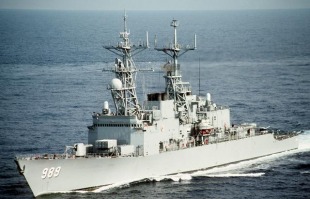Destroyer USS Deyo (DD-989)
Basic information
Ship measurements
Machine
- 4 * General Electric LM2500 gas turbines
- 2 * shafts, 80,000 shp (60 MW)
Personnel
Combat assets
- AN/SPS-40 air search radar
- AN/SPG-60 fire control radar
- AN/SPS-55 surface search radar
- AN/SPQ-9 gun fire control radar
- Mark 23 TAS automatic detection and tracking radar
- AN/SPS-65 Missile fire control radar
- AN/SQS-53 bow mounted Active sonar
- AN/SQR-19 TACTAS towed array Passive sonar
- Naval Tactical Data System
- AN/SLQ-32 Electronic Warfare System
- AN/SLQ-25 Nixie Torpedo Countermeasures
- Mark 36 SRBOC Decoy Launching System
- AN/SLQ-49 Inflatable Decoys
- 2 * 5 in (127 mm) 54 calibre Mark 45 dual purpose guns
- 2 * 20 mm Phalanx CIWS Mark 15 guns
- 1 * 8 cell ASROC launcher (removed)
- 1 * 8 cell NATO Sea Sparrow Mark 29 missile launcher
- 2 * quadruple Harpoon missile canisters
- 2 * Mark 32 triple 12.75 in (324 mm) torpedo tubes (Mk 46 torpedoes)
- 1 * 61 cell Mk 41 VLS launcher for Tomahawk missiles
- 2 * Sikorsky SH-60 Seahawk LAMPS III helicopters
The USS Deyo (DD-989), a destroyer from the Spruance class, belonged to the United States Navy, bearing the name of Vice Admiral Morton L. Deyo (1887–1973), an experienced destroyer commander and esteemed leader of naval gunfire support task forces during World War II.
Construction for Deyo began on 14 October 1977 at Ingalls Shipbuilding in Pascagoula, Miss. The vessel was launched on 20 January 1979 and commissioned on 22 March 1980.
Deyo engaged in operations across the Atlantic and Eastern Pacific Oceans, Caribbean and Mediterranean Seas, and the Persian Gulf. Its initial deployment was in May 1981, responding to escalating tensions in the Middle East by heading to the Persian Gulf.
In July 1987, Deyo joined the Iowa Battleship battle group, venturing to the Mediterranean, North Arabian Sea, and the Indian Ocean. Returning to the Persian Gulf in July 1989, it undertook duties supporting tanker escort missions during Operation Earnest Will.
Following counter-drug activities in the Caribbean Sea in August 1990, Deyo joined the Forrestal Carrier Battle Group in the Mediterranean Sea in May 1991. In 1993, it visited Liverpool, England, and represented the US during the 50th Anniversary Celebrations of «The Battle of the Atlantic.» In 1994, the destroyer was part of the George Washington Carrier Battle Group in the Mediterranean Sea.
In June 1996, while moored in Newport News, Deyo was struck by the Military Sealift Command vehicle cargo ship USNS Gilliland (T-AKR-298) due to a sudden windstorm. Gilliland broke free from its moorings, colliding with Deyo and the submarine USS Tucson (SSN-770) ahead of Deyo. Deyo sustained the most damage, while Tucson had minor damage.
Re-deploying in June 1998 to the Mediterranean Sea, Deyo made history as the first American ship to serve as the flagship for Standing Naval Force Mediterranean.
During its final deployment in December 2002 with the Harry S Truman Carrier Battle Group, Deyo fired Tomahawk cruise missiles at Iraqi targets during Operation Iraqi Freedom.
Deyo was distinctive as the sole Spruance-class destroyer equipped with armored box launchers later upgraded to the Mk 41 VLS.
Ultimately, on 6 November 2003, Deyo was decommissioned at NS Norfolk, Virginia. It was removed from the Navy list on 6 April 2004 and sunk as part of a fleet training exercise on 25 August 2005.
- Comments
 en
en ru
ru uk
uk





 United States Navy
United States Navy Ingalls Shipbuilding
Ingalls Shipbuilding